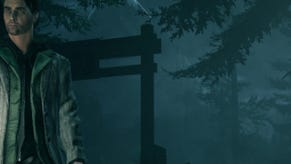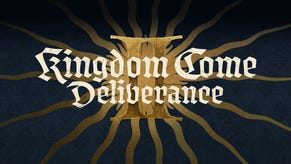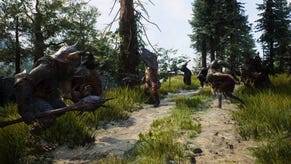Alan Wake's American Nightmare dreams of the future
It may not be Wake 2, but American Nightmare doesn't mark the end of Alan's shadowy adventures. We visited Remedy to talk about continuing 360's most unsettling dream.
"We are going to continue with Wake. We think there's a lot of potential. This is one step on Wake's path forward, and it certainly doesn't end here. For some gamers it begins here, and we think this is a cool entry point. But right now, this is what we're focused on."
It's an obvious question greeted by laughter and a rehearsed answer. What's Remedy going to say when everyone moans about the next Alan Wake game not being a full sequel?
"We are going to continue with Wake; we think there's a lot of potential," says CEO Matias Myllyrinne, speaking at the studio's offices in Espoo, Finland, earlier this month.
"This is one step on Wake's path forward, and it certainly doesn't end here. For some gamers it begins here, and we think this is a cool entry point. But right now, this is what we're focused on."
'This' is Alan Wake: American Nightmare, a digitally distributed stop-gap between Remedy's notoriously delayed original and whatever comes next. It's "close to five hours" long, according to head of franchise development Oskari Häkkinen, and transports Wake from America's tree-strewn Pacific Northwest to the Arizona desert.
The Twin Peaks surrealism beloved by fans is still present, as are the touchstones of torch-based combat and otherworldly narration, but this isn't quite the Wake you knew.
Myllyrinne describes it as "a combination of adrenaline-fueled arcade-action mode and an exaggerated pulp-action adventure," drawing "heavily on supernatural, sci-fi and pulp movies, urban legends and classic Americana. It's Route 66, if you will."
The structure, too, has shifted. "If Alan Wake was two-thirds story and one-third action, American Nightmare is one-third story and two-thirds action," Myllyrinne adds, before likening it to Tarantino's From Dusk Till Dawn.
American Nightmare's single-player consists of an episode of Night Springs, the horror show featured in the first game written by Wake himself. Alan's facing off against Mr Scratch, his evil double, a Patrick Bateman lookalike featured throughout in live-action shorts replete with hotel room victims in various states of bondage. His plan is to eventually kill Alice, Wake's wife.
Constant shooting
Häkkinen plays through a section in which Wake fights his way to the top of an observatory, guided by a wailing woman. It's constant shooting with the occasional plot anchor, showing Wake questing for a sheet of typed script. He thumps enemies with a nailgun before moving on to assault rifles, shotguns and Uzis. The play culminates in a defense section, with Wake fielding waves of enemies inside the observatory with a variety of weapons.
American Nightmare also comes with a challenge mode called Fight Till Dawn, which has scoreboards, more weapons, new enemies and unlockables. Obviously, you fight till the sun comes up. This is as close to 'online play' as American Nightmare gets.
Online or offline, though, it's combat all the way. The focus on action is due to the nature of the delivery method, says Häkkinen: it's "for the digital space, made for the medium." But it's a standalone spin-off Myllyrinne thinks will challenge XBLA conventions as it's a "hardcore, cinematic action game."
He adds: "Stepping back from the game, we've been looking at how the environment's been changing, how the eco-system's been changing, and I think it's becoming more and more viable for teams such as Remedy to create digital experiences, to do those much quicker and to listen to people. We've done that with the gameplay, and I hope we'll be able to do that in the future with much more rapid iterations. I think that would be really cool.
"The good part about crafting something for five years is crafting something for five years, but the bad part is that you're not necessarily constantly in touch with your fanbase."
Following the inevitable push-back on the semi-sequel after its VGA announce earlier this month, Myllyrinne and Häkkinen are keen to stress this isn't Wake 2, but that neither is it the same bracket as more traditional XBLA games such as Limbo and Super Meat Boy. There's be no confirmation of pricepoint, but $15 is expected. It'll be out "very early next year".
The conversation drifts forward to future talk. Häkkinen tells me that the deal in place over the original game is similar to that between Microsoft and EA over the original Mass Effect, where the first game was tied as a console exclusive to Xbox 360. I ask Myllyrinne and Häkkinen whether or not they're interested in looking at Steam and PSN for future triple-A projects and they both nod without hesitation.
"Absolutely," says Myllyrinne. "We are an independent studio, and I think we will always make games that we play and games on platforms where the gamers are. I think those are the two cool drivers."
For the moment, though, Alan Wake is to remain with Microsoft, who will publish American Nightmare. Remedy came forward with the game as the next step in Wake's adventure and Microsoft was "supportive" of the idea of an XBLA-only update, so don't expect it to appear elsewhere.
And with the PC version of the original Alan Wake being self-published by Remedy on Steam early next year, it seems Alan's nightmare is far from over. As for the sequel, however, you'll just have to wait. But here's a clue; it's unlikely Remedy would make all those desert assets for a short piece of XBLA shooting, isn't it?
















